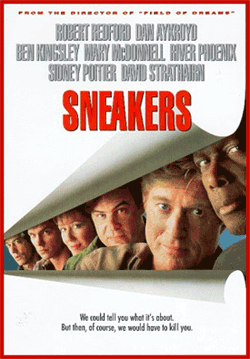FILM NOTES
FILM NOTES INDEX
NYS WRITERS INSTITUTE
HOME PAGE

(American, 1992, 126 minutes, color, 35 mm)
Directed by Phil Alden Robinson
Cast:
Robert Redford . . . . . . . . . . Martin Bishop/Martin Brice
Sidney Poitier . . . . . . . . . . Donald Crease
David Strathairn . . . . . . . . . . Erwin ‘Whistler’ Emory
Dan Aykroyd . . . . . . . . . . Mother
River Phoenix. . . . . . . . . . Carl Arbegast
Film director Phil Alden Robinson will provide film commentary and answer questions immediately following the screening.
The following review by Michael Dwyer appeared in The Irish Times, November 13, 1992:
Breezy, polished and fast-moving, Phil Alden Robinson’s Sneakers is a neatly devised comedy/thriller which dresses up the old-fashioned caper movie with ultra-sophisticated technology…Sneakers takes its title from a slang term for hi-tech wizards, and its message—frequently stressed—is that the individual’s right to privacy is being eroded by powerful data collection agencies. "There’s a war out there; a World War," declares the villain of the piece. "And it’s not about who’s got the most bullets, it’s about who controls the information." The movie opens on a prologue set in the late 1960s as two radical college students illegally use a computer to transfer funds from the Republican Party’s account to the Black Panthers. One of the students is caught and jailed; 25 years later, after a clever credits sequence, the other, Bishop (played by Robert Redford), runs a San Francisco office staffed by Sneakers who are hired to penetrate systems and test their security.
They include a sacked CIA operative (Sidney Poitier), an ex-convict (Dan Aykroyd) obsessed with conspiracy theories, a blind sound expert (David Strathairn) who reads pornography in Braille, and a teenager (River Phoenix) who broke into his college’s computer system to change his grades and award himself a scholarship. Bishop’s own college past catches up with him when two government agents threaten to expose him unless he and his team take on a covert operation to steal a code unscrambler held under apparently impregnable security.
Director Robinson makes clever and often amusing use of all the elaborate gadgetry at his disposal, and he expertly alters the mood of the movie as the tone darkens and the line between comedy and thriller is crossed in the second half. Whichever the mood, he never loses sight of the movie’s message on information and privacy.
The following is taken from a review by Nigel Andrews that appeared in The Financial Times of London, Nov. 12, 1992:
Redford and his team of fellow forty/fiftysomethings Sidney Poitier, Dan Aykroyd and David Strathairn—with River Phoenix as token youngster and Mary McDonnell as token moll—are 1960s survivors in search of a 1990s mission. The Cold War is over, but the catarrh of conspiracy delirium lingers: allowing Robinson and co-scenarists Lawrence Lasker and Walter F. Parkes (who penned that seminal computer caper WarGames) to make Sneakers a delicious postmodern parody of films like Three Days Of TheCondor and The Parallax View.
This is a world with no easy international enmities to concentrate the mind, and no easy utopias in technology itself. The best scenes show the thrill and the fallibility of the hi-tech age: an earpiece-prompted scam by Redford that gets hilariously out-of-sync, a heist that defies every security system but human error, a ‘perfect getaway’ in which the only available driver is a blind man.
If Robinson’s last comedy-elegy to a world of vanished ideals, Field Of Dreams, was a mixed artistic crop—part wry, part corn— Sneakers is all crackling shoots of irony, grown from the fertile ground of pre-millennial anxiety. And no one handles the ironic mode better than Redford: the cocked quizzicality, the lightning tics of despair or self-deprecation, the sense of a golden boy lost in the engulfing glitter of another techno-dawn.
MISCELLANEOUS: When Sneakers was released in 1992, film journalists received a computer disk containing a synopsis, production notes, stills and cast biographies—the first digital press kit in movie history. The film was also among the first to be marketed on the Internet. Compuserve put Phil Robinson live on line to answer the questions of early net users.
— Compiled by Mark Koplik
For additional information, contact the Writers Institute at 518-442-5620 or online at https://www.albany.edu/writers-inst.
 Sneakers
Sneakers